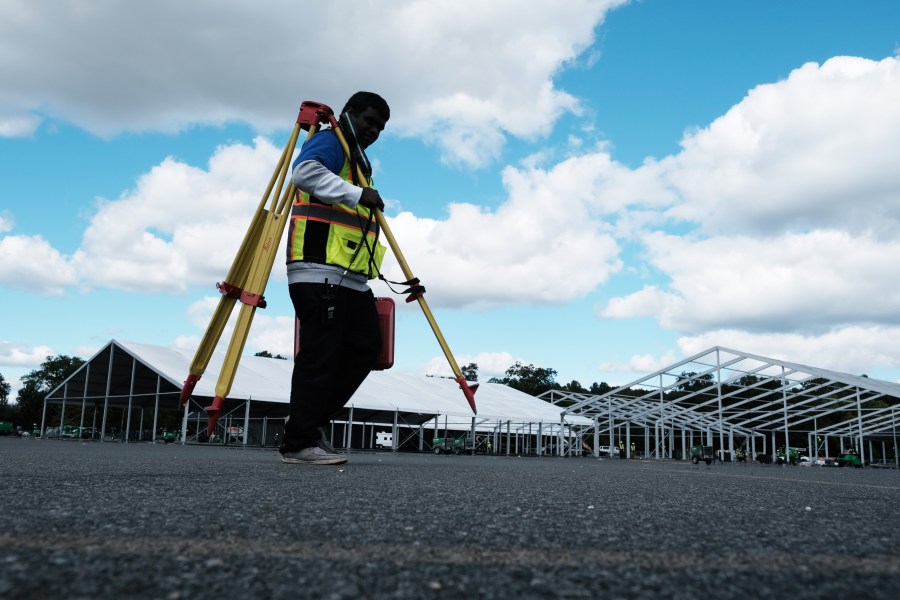Migrants in NYC: ‘Right-to-shelter’ showing stress cracks

A bus with migrants on board, originating in Texas, arrives at Port Authority Bus Terminal in New York City on August 25, 2022. – Since April, Texas Governor Greg Abbott has ordered buses to carry thousands of migrants from Texas to Washington, DC, and New York City to highlight criticisms of US President Joe Bidens border policy. (Photo by YUKI IWAMURA/AFP via Getty Images)
Correction: A previous version of this story misquoted the amount per month it costs to host someone in the New York shelter system.
(NewsNation) — New York City is facing the enormous task of providing shelter to thousands of migrants arriving from the southern border, and it’s testing the bounds of a unique and decades-old rule aimed at sheltering all. It’s reigniting a debate over whether the city’s approach to caring for the unhoused helps or hinders the long-term reduction of homelessness.
Almost 60,000 New Yorkers — including more than 16,000 children — will rely on the city’s homeless shelter system for a bed tonight. That’s in addition to more than 10,000 migrants who have been bused in in recent months — overwhelming the system so severely, authorities are putting people in hotel rooms.
New York is the only state that shelters at least 95% of unhoused people, according to government housing data. That’s due to a series of court mandates and a subsequent consent decree, which guarantee the “right to shelter” for every person. New York is the only state with such a rule.
In the late 1970s, the city’s shelter system was so overwhelmed, men were often turned away, even on the coldest of nights, said lawyer Robert Hayes.
Eventually, the decree essentially confirmed that shelter is a constitutional right in the state of New York for all. It was as much a cultural change as it was a legal one, Hayes said.
“The cultural change that was kind of triggered by the litigation and (media) coverage pretty much resulted in folks understanding that homelessness is not a choice of freedom,” he said.
Still, the right to shelter only solves one part of the issue — and it’s hard to call tens of thousands of people seeking temporary shelter each night a “victory,” Hayes said.
“On the other hand, if not for the right to shelter, where would those 60,000 people be tonight?” he said. “The right to shelter has been a bulwark of survival. It has eased … misery and risk of death. There is a value in having a roof for the night.”
Temporary vs. permanent
Those who can’t afford heating and cooling are the most vulnerable to temperature-related death. In New York City, about three-quarters of temperature deaths occur outdoors.
Critics say the resulting wide network of shelters is expensive, burdens already poor areas of the city, is slow to funnel people into permanent housing or supportive services, and siphons money away from more efficient programs.
“The incentive system … plus the legal mandate creates this kind of gridlock on getting out of this situation that we’re in, where we’re spending billions on managing homelessness, but not ending it,” said New York University social work professor Deborah Padgett.

Many think more funding should go into a housing-first approach, which has seen success in Utah, Wisconsin, Texas and California. Under this model, people are placed in permanent housing, then offered the social services they need to rebuild their lives, such as mental health care or job placements.
Housing-first costs significantly less than putting people in temporary shelters, says Padgett, who estimates a shelter bed costs taxpayers $3,000 per month.
“We really need a right to housing more so than we need a right to shelter,” she said. “Shelters in New York quickly became crowded and troubled by violence, drugs and theft. And here we are in 2022 — it’s the same as it was.”
The biggest issue hindering moving people into permanent shelters is the lack of affordable housing, both Hayes and Padgett said. This problem also can be traced back to the ’80s, Padgett said, when the city government stepped away from building housing, leaving people “dependent on the crumbs from the table of the developers.”
‘Humane flexibility’
What almost all agree on: Emergency shelters keep unhoused people alive, and the years since the right-to-shelter decision have seen an overall decrease in temperature-related mortality in New York.
Still, it’s difficult to assess how direct that connection is due to inconsistent and incomplete data. Death certificates don’t always record heat or cold as the cause, nor that a person was unhoused.
The data is even more opaque when it comes to the 7,300 migrants who remain within the homeless system. Experts say the asylum seekers will need very different assistance than a typical unhoused person, such as immigration legal advice and language help.
Mayor Eric Adams has tried to differentiate between the asylum seekers and those who traditionally would need a homeless shelter, and set up a mass shelter in the Bronx made up of large, heated industrial tents. Immigration advocates say the location of the shelter is far from public transit and government services, and is prone to flooding.
“While we appreciate that the city has been communicating with us on this crisis, we still have many outstanding questions and concerns relating to the availability of critical services for these vulnerable individuals and families,” wrote the Coalition for the Homeless in a statement.
“To get some federal support, to create a separate system given the different needs of most of these migrants, I think that’s probably the way to go,” Hayes said of helping the migrants resettle. “And that may call for some different support services and may call for the recognition that … the consent decree maybe should be applied with some degree of humane flexibility. ”









